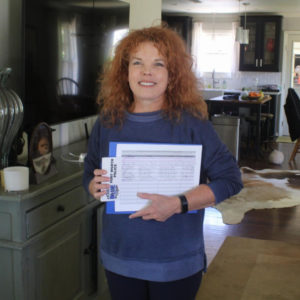Looking back, it was the prophecies that worried Sam the most.
The former survivor of sex trafficking — along with forced labor, the term falls under the umbrella of human trafficking — told me she now regrets the years she spent under the care of the husband-and-wife team of Heather and Landon Schott. The leaders and co-founders of Mercy Culture Church, a charismatic nondenominational organization that’s part of a broader Christian Nationalism movement, essentially and allegedly told Sam she was going to do great things — for God, for herself, and, perhaps most importantly, for Mercy Culture.
Sam said she was one of more than a dozen sex trafficking survivors to come into the Schotts’ care. She’s also one of two who came to me to tell me what’s really going on at the Northside church that draws a few thousand worshipers every Sunday. We are concealing her real name to protect her privacy and shield her from retaliation.
Landon Schott, Sam recalled, “prophesized speaking events and volunteer opportunities” for the sex trafficking survivors. Almost every prophecy was going to give [the Schotts] gain in some sort of fashion. As survivors, our identity and worth are ensnared in what we can give to someone because we were [conditioned] to be on our trafficker’s good side. When someone is prophesizing that God, who you now have a relationship with, is saying you should be doing this and that, you are going to do it. It was definitely a power play.”
The Schotts have not returned my repeated attempts to reach them for comment.

Edward Brown
The lead pastors at Mercy Culture, she said, would regularly prophesize that young women who escaped violence, rape, and abuse at the hands of sex traffickers would give testimonials at fundraisers for a 100-bed sex trafficking shelter to be built near Oakhurst on the North Side. Church leaders recently withdrew their bid to build the shelter, which required zoning variances from the city, amid overwhelming repudiation by Oakhurst residents, who told me the Justice Residences were ill-conceived and likely a moneymaking scam by the Schotts.
The other sex trafficking victim I spoke to, Jess, told me the Schotts created a toxic environment at church, where trafficking survivors are allegedly pressured by Heather to compete for her attention and affection. The darker and grittier the public recounting of abuse during services and fundraising events, the more favorably those survivors are allegedly treated by Mercy Culture leaders, who show little interest in actually helping the trafficking victims, Jess alleges.
“They cultivated relationships with all of us initially,” Jess said. “It happened slowly. I felt like once they had gotten my story, it was time to move on. All of a sudden, they are on to the next survivor who will give her testimony. They pitted competition among us.”
Jess alleges that one girl was mortified to be called the “superstar” of the group.
“She didn’t want to be the star of sex trafficking,” Jess said.
The recounting of emotional and spiritual abuse at the hands of Mercy Culture leaders follow recent reporting by our magazine of similar horror stories by students at Mercy Culture Preparatory, the private school on the church’s Northside campus. One former Mercy Prep student told me that children and teens are frequently targeted by church leaders for not exhibiting uncompromising devotion to Mercy Culture directives or for questioning church doctrine that sees all other Christian denominations as somehow non-Christian (“Grooming Christian Nationalists?,” June 8).
Even with the constant stream of accusations of abuse by church leadership, Mercy Culture Church enjoys the staunch support of Christian Nationalist public figures like Sheriff Bill Waybourn and county judge candidate Tim O’Hare, both Republicans who make regular appearances at Mercy Culture services and events.
Sam said she worries for her fellow survivor friends who have not realized that Mercy Culture may be exploiting sex trafficking victims for purely financial reasons.
“A lot of us had a weird feeling in our stomachs when we first went,” Sam said. “We weren’t sure at first if it was because we had been through a lot. It took me over a year to realize what was happening. [Mercy Culture leaders] are masters of manipulation.”
*****
Pam said several trafficking victims she works with began displaying unsettling changes just months after attending Mercy Culture Church. We are concealing the trafficking advocate’s identity to protect her privacy.
“There was a shift, where they withdrew” from their former support group, Pam said, referring to her advocacy work. “We encourage [survivors] to have outside support. The church leaders isolated them. They were cutting everyone off who wasn’t part of Mercy Culture. That’s a red flag. The [survivors] were really nervous to talk.”
Pam learned from trafficking victims who attended Mercy Culture that Heather Schott was allegedly telling the girls and young women that gossip is a sin and not to discuss what they saw inside the church with others. It took weeks and even months at a time to deprogram the trafficking victims, Pam said.
“We had to talk through what gossip really means,” Pam said. “Are you slandering people, or are you telling people that your experience wasn’t good? I did that with multiple [current and former Mercy Culture women]. They have been told not to talk. Once they were comfortable talking, that’s when they found their voice again. When they started coming out, they were so deeply hurt. They had a relationship with God [before attending Mercy Culture], and this has set them so far back.”
The trauma of allegedly being manipulated and exploited by a church caused one young woman to return to sex work, Pam said.
The trafficking-victim advocate said faith-based solutions to healing are important, but Mercy Culture leaders appear willfully ignorant of the complexity of the psychological and emotional damage that trafficking survivors endure. Pam said Heather’s alleged mistreatment of the girls and young women who went to Mercy Culture for help is widely known in the broader network of nonprofits and faith-based groups which supports trafficking victims.
The Justice Residences have become a local example of how not to help trafficking victims. Jess said Mercy Culture’s proposed shelter concerned her from the get-go.
“It reminded me of a jail,” Jess said. “They are going to put 100 girls in one building and then pray? I believe in the power of prayer, but there has to be other forms of support.”
In April, members of the Oakhurst Neighborhood Association overwhelmingly voted against the Justice Residences. During an early April presentation, Heather made a last-ditch effort to appeal to area residents by recounting her past addiction to drugs.
“Around the age of 17, I went out and was mixing drugs and alcohol all night long,” Heather told the group. “A dealer dropped a bag of ecstasy and drove over it. We snorted line after line for hours. I blacked out. I was driven to an abandoned apartment.”
One resident who heard Heather’s presentation that day later told me via Instagram Messenger that the pastor’s “Reefer Madness” story of suffering did nothing to address concerns about what qualified the pastor and her husband to head a 100-bed shelter for sex trafficking victims.
Sam said Heather would often recount her drug addiction when saying she understood the plight of sex trafficking victims.
She “knew zero of what I’ve lived through,” Sam said. “Sure, start with drug addiction. Then add being raped every day. Add being manipulated, then add Stockholm syndrome and molestation. Her ignorance and lack of trauma-informed insight were astounding.”
Sam said she has since found reputable nonprofits that have helped her heal. She knows that many of those charities run on tight budgets. The former trafficking victim said she is appalled by how much money she believes the Schotts have raised for the Justice Residences through fundraising events. Sam estimates the amount to be in the hundreds of thousands of dollars.
“It is disgusting how much money the Schotts have raised,” Sam said. “I wanted to warn people, ‘Stop giving these people your money. They are hurting people.’ Use your donations for supporting organizations that have evidence that they have helped people. It is insane how these organizations that are radically changing survivors’ lives are struggling. Then you have the [proposed shelter] that is serving no one, and they are getting money.”
*****
Since 2007, the national nonprofit Polaris has managed the National Human Trafficking Hotline (1-888-373-7888) to connect victims of sex and labor trafficking to resources and service providers. According to data collected by Polaris, hotline directors have said 64,718 likely victims of human trafficking have called the hotline since 2007. Through its website (HumanTraffickingHotline.org), the nonprofit describes common misconceptions about human trafficking.
“By far, the most pervasive myth about human trafficking is that it always or often involves kidnapping or otherwise physically forcing someone into a situation,” the website reads. “In reality, most human traffickers use psychological means such as tricking, defrauding, manipulating, or threatening victims into providing commercial sex or exploitative labor.”
Sgt. Brian Johnson, head of the Fort Worth police department’s Human Trafficking Unit, said his police department’s first dedicated human trafficking detective was hired in 2006, and the program has slowly grown to include two detectives, two officers, one sergeant, and a civilian coordinator.
Investigations into human trafficking are inherently complicated, Johnson told me in a phone interview.
“Investigations can last six to 12 months,” he said. “They often lead to identifying more victims and suspects. We may talk to one girl, and she may describe another girl who may be a minor. The trafficker may only go by a street name. We have to figure out who that is. The victims usually don’t have enough information to identify their [trafficker]. Once they are identified, warrants are issued, and interviews are conducted.”
The unit relies on tips and active operations that target online ads and forums that sex traffickers use to attract business. Finding a possible trafficking victim doesn’t always lead the women or girls to disclose any alleged crimes that may have occurred, Johnson said, due to the psychological stranglehold the traffickers usually have over their victims.
“Usually, they don’t want anything to do with us,” Johnson said. “We will often encounter the same victim multiple times before they outcry that something happened or they provide information about what is happening to them. It is very rare with an initial encounter with a victim that they disclose what is happening. These girls are taught to hate the police. They are told we will take them away from family and friends. They are manipulated by their trafficker to believe that the police are bad. We have to break that and explain we are here to help them.”
Often complicating matters, Johnson continued, is traffickers’ use of controlled substances to make their victims more compliant and docile. For the unit to be able to pursue traffickers on criminal charges, there has to be evidence of force, fraud, or coercion while any solicitation of a commercial sex act involving a minor is automatically investigated, Johnson said.
Johnson said his unit could use more personnel and resources. Having additional resources would allow his team to be more proactive in the hunt for traffickers, he said. The sergeant said he welcomes tips, but anyone who witnesses a crime in progress — such as a woman being dragged into a car or building or a minor offering commercial sex acts — needs to call 911 immediately. For non-urgent tips, call 817-392-4553.
“Depending on the nature of the tip, they may be asked to complete a report with our Data Reporting Unit,” Johnson said.
Jess said that young girls can be forced into sex work in the nicest of neighborhoods.
“It could literally be happening at your next-door neighbor’s home,” she said. “I was trafficked out of a suburb. The house was a $250,000 home in a nice neighborhood, somewhere you would let your kids walk. There are so many different ways this happens.”
*****
Pam said she works with many churches that do great work providing funding to and resources for sex trafficking victims in Tarrant County.
“They are not trying to be the heroes,” Pam said. “They are supporting the organizations that know how to do the work and not saying they are going to do this thing in our own way.”
Survivors, especially if they have been free for only a relatively short time, are incredibly vulnerable to manipulation and coercion, Pam said.
“They came from a place of abuse, manipulation, and control,” Pam said. “Many were sexually abused as children. A lot of their abuse goes way back. Going to [Mercy Culture] took many of these women so far back.”
Being an advocate is tough work, Pam continued, because part of her job involves letting survivors have their own journey, even ones who have setbacks. With her years of experience guiding and supporting trafficking survivors, Pam has learned that churches play an important but discreet role in helping minors and women recover from abuse and rape.
“It takes a village,” she said. “It’s not just one program or one person. They need to be supported with therapy, mentoring, support groups, and career counseling. It’s retraining their brain. We offer individual counseling and mentoring. It’s a long list.”
Fort Worth offers adequate resources for trafficking victims, Pam said, but there is a need for housing units that can serve six to eight women at a time.
Sam said she has learned that her time and story have value. Reputable organizations would never ask survivors to recount their traumatic stories for no compensation, and she hopes Mercy Culture’s leaders stop asking trafficking victims to speak for free and volunteer their time for causes that raise hundreds of thousands of dollars for the megachurch and its elders.
“There are a lot of survivors who had relationships given and taken from them” prior to coming to Mercy Culture, Sam said, adding that Heather’s alleged manipulation retraumatized many women who sought healing at the megachurch. “One thing that was so difficult to see were survivors being invited to give input and then being silenced.”
Despite her serious concerns about the alleged mistreatment of trafficking victims at Mercy Culture Church, Pam said she never wants to see any church fail.
“We want to see them change for the better,” Pam said. “My purpose is to be an advocate for survivors, and as a believer, I want to see change happen. [Mercy Culture’s] leadership believes they are doing everything right. I don’t know how to change that mindset. My hope would be that they change and people aren’t hurt. My fear is that more and more people are going to be sucked in, be hurt, leave with deep wounds, and that the spiritual abuse continues.”













If you are looking for a church that is genuine in it’s beliefs, and does good things for those marginalized folks in our community, look to Broadway Baptist.